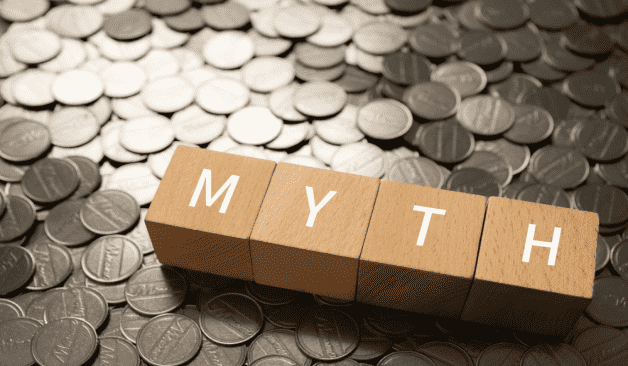
Money myths that can hurt you
There are two things that everyone wants in their life - Money and Happiness. The majority believes that money leads to happiness - we will not go into that side of the discussion. We will focus on money in today's article.
Money is one of the most crucial aspects of our lives, and no one can deny that fact. We spend a large part of our day at work to earn money and make our lives happy, along with our loved ones.
Earning money alone does not solve the problem - you can still be in trouble and lead an unhappy life if you don't get your basics cleared. In this article, we will discuss some of the common money myths that can get you in trouble if you believe them.
Money myths that can hurt you
Here are the top 7 money myths that every individual should be aware of and break:
Money will solve all your problems: Money can solve most of your problems, but it won't solve all your problems. It can take care of your food, shelter, and fancy clothes. However, it cannot solve your life's challenges. You should earn money to fulfill your goals and not link it to your happiness level. Work hard to earn money. However, it is crucial to prioritize your values, relationships, and personal well-being alongside financial goals to form a balance.
Credit card is free money: We have seen so many youngsters get trapped in debt because they don't understand the consequences of using credit cards irresponsibly. In their early careers, they get into a debt trap, and it takes them years to come out of it - something that can be avoided if you stop believing the credit card is free money. Misusing credit cards by accumulating high-interest debt can lead to financial stress and difficulties in the long run. It's crucial to use credit cards wisely and pay off the balances in full each month.
Investing is only for the wealthy: In India, the percentage of wealthy individuals is minuscule. The remaining people think that investing is only for the rich. When we refer to investing here, we don't mean just buying mutual funds and stocks randomly. Investing is a process that has to be continuously planned and executed. Most people believe that it is something that only the rich need to do. However, it is untrue. Whether you earn Rs 4 lakh or Rs 40 lakh a year - you need to plan your investments. If you can execute your plan, you will be one step closer to becoming wealthy.
To save and invest, they need to earn more: This is a narrative given by most in India. When you start your career, the salary is lower, and as you gain experience, you may get an opportunity to earn more. A large majority have this excuse that they are not investing because they have a lower salary. They can plan to start investing when they earn more. Here is one of the crucial lessons you can take from this article - investing money is a habit - it has nothing to do with the money you earn. Today, many mutual funds allow you to start your SIP with as little as Rs 500 per month. In the previous generation, in most Indian houses, mothers were not earning, but they were still saving, right?
Buying the cheapest option is best: Till now, we have been talking about investing. To invest, people have to save, and to save, they take the wrong route. While being frugal and finding good deals is vital, the cheapest option isn't always the best choice - that is not how you save money. Sometimes, paying a little more upfront can save you money in the long run by investing in quality products or services that last longer or provide better value. If you decide to save money by buying a cheap option, you may lose more in the long term. Have a clear mindset - where and how to save money.
Emergency fund is a top priority: We mentioned above that many young people get into debt traps. Let us highlight how it happens. Assume you were unable to pay your credit card bills. The interest of 20 or 30 percent keeps accumulating on the unpaid amount. You are working hard to pay off the debt. You hear an expert telling you 'create an emergency fund' - it is the first step in the financial journey. You start building it, and before you realize it, your debt has almost doubled.
If you need to choose between clearing debt or creating emergency funds - you must always select debt clearing. The emergency fund is definitely on the list, but clearing debt is the zeroth point, and most people get it wrong. The wise thing to do is pay off your high-paying credit card bills before you save for a rainy day. Yes, you should be concerned about an inadequate emergency fund. Please note that if you start paying down debt, you will have greater access to liquidity if the need arises.
Debt is always bad: The last point, but maybe the most crucial. Not all debts are created equal. While high-interest consumer debts like credit card debt can be detrimental to your financial health, not all debt is necessarily bad. For example, taking on a reasonable amount of low-interest debt to finance education or start a business can be a strategic investment that pays off in the long run.
Before you go
To sum up, these are the most common myths around money that most believe to be true - knowing or unknowing. The important thing is to continuously learn and ensure you are breaking the shackles of myth and taking one step towards a better life - a life where you will find a perfect balance between money and happiness.










